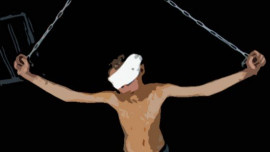
What allows such incidents to proliferate is the dangerously precarious position Pakistan occupies between tradition and modernity. The trappings of modernity — from the nation state to attendant economic dislocation and social fragmentation — have penetrated Pakistani society enough to cause a breakdown in the structures of traditional social authority. Previously, hierarchical mechanism of social control, such as elders, biraderi networks and tribal ties, were able to exert a form of order, albeit a highly conservative one. This is decreasingly the case, and the power of traditional community leaders is ebbing.
The Pakistani state has been thoroughly incapable of filling this social vacuum with well functioning institutions. In this it has failed in its most basic function: to provide for the security and welfare of its citizens. Pakistan spends so much time obsessing, and obsessively spending on, an externally oriented military security apparatus that it scarcely has the capacity to maintain law and order. Law enforcement in much of Pakistan borders on the non-existent. Moreover, the judicial system, particularly at the lower levels where the majority of citizens are likely to encounter it, is unraveling at the seams. These are the real threats to Pakistan; parasites consuming it from within, not predators stalking it on the outside. The receding authority and legitimacy of both traditional social structures and the state were on display in Sialkot. Members of the community and functionaries of the state — the police officers who idly stood by — were equally impotent in stemming the orgy of violence. A steady brutalisation of Pakistan’s social psyche has occurred in this context. The state and traditional power-brokers have been fully complicit in this process by making a virtue out of violence, and by contributing to intolerance, ethnic and sectarian fissures that spew an unceasing stream of hatred. Thus Pakistan’s predicament is not that it is too traditional or not modern enough (or vice versa), but rather that it is lost in a twilight of inertia where it is not sufficiently either. This condition was vividly captured by Germaine Tillion on the eve of the violent decolonisation of Algeria, who may well have written that Pakistanis too are “living on the frontiers of two worlds — in the middle of the ford — haunted by the past, fevered with dreams of the future. But it is with their hands empty and their bellies hollow that they are waiting between their phantoms and their fevers.”
The middle of the ford holds only a brutal confusion cannibalising Pakistani society. It is where these two children in Sialkot and too many others like them have drowned in their own blood.
Published in The Express Tribune, September 2nd, 2010.

1722586547-0/Untitled-design-(73)1722586547-0-165x106.webp)


1732326457-0/prime-(1)1732326457-0-165x106.webp)












COMMENTS (9)
Comments are moderated and generally will be posted if they are on-topic and not abusive.
For more information, please see our Comments FAQ